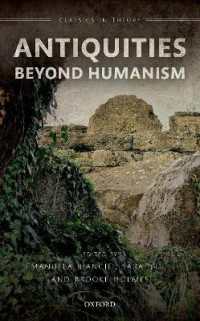基本説明
New in paperback. Hardcover was published in 2001. Critically examines the question of whether there is a right to intervene in a civil conflict for humanitarian reasons.
Full Description
The question of the legality of humanitarian intervention is, at first blush, a simple one. The Charter of the United Nations clearly prohibits the use of force, with the only exceptions being self-defence and enforcement actions authorized by the Security Council. There are, however, long-standing arguments that a right of unilateral intervention pre-existed the Charter.
This book, which won the ASIL Certificate of Merit in 2002, begins with an examination of the genealogy of that right, and arguments that it might have survived the passage of the Charter, either through a loophole in Article 2(4) or as part of customary international law. It has also been argued that certain `illegitimate' regimes lose the attributes of sovereignty and thereby the protection given by the prohibition of the use of force. None of these arguments is found to have merit, either in principle or in the practice of states.
A common justification for a right of unilateral humanitarian intervention concerns the failure of the collective security mechanism created after the Second World War. Chapters 4 and 5, therefore, examine Security Council activism in the 1990s, notable for the plasticity of the circumstances in which the Council was prepared to assert its primary responsibility for international peace and security, and the contingency of its actions on the willingness of states to carry them out. This reduction of the Council's role from substantive to formal partly explains the recourse to unilateralism in that decade, most spectacularly in relation to the situation in Kosovo.
Crucially, the book argues that such unilateral enforcement is not a substitute for but the opposite of collective action. Though often presented as the only alternative to inaction, incorporating a `right' of intervention would lead to more such interventions being undertaken in bad faith, it would be incoherent as a principle, and it would be inimical to the emergence of an international rule of law.
Contents
Introduction ; 1. The Just War: The origins of humanitarian intervention ; 2. The Scourge of War: Humanitarian intervention and the prohibition of the use of force in the UN Charter ; 3. 'You, the People': Unilateral intervention to promote democracy ; 4. The New Interventionism: Threats to international peace and security and Security Council actions under Chapter VII of the UN Charter ; 5. Passing the Baton: The delegation of Security Council enforcement powers from Kuwait to Kosovo ; 6. Just War or Just Peace? Humanitarian intervention, inhumanitarian non-intervention and other peace strategies ; Bibliography








